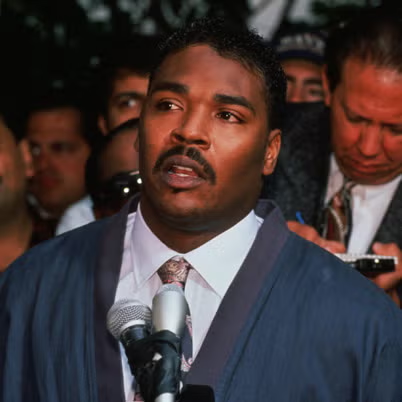
Table of Contents
Who Was Rodney King?
Rodney Glen King (April 2, 1965 – June 17, 2012) was an African American man whose brutal beating by Los Angeles Police Department (LAPD) officers on March 3, 1991, became a pivotal moment in the history of racial tensions in the United States. Following a high-speed car chase, King was forcibly removed from his vehicle and violently assaulted by officers, an incident captured on videotape by amateur cameraman George Holliday. The footage, broadcast nationwide, ignited widespread outrage and became a symbol of police brutality and systemic racism.
The four LAPD officers involved—Laurence Powell, Timothy Wind, Theodore Briseno, and Stacey Koon—were charged with assault with a deadly weapon and excessive use of force. However, after a three-month trial held in Simi Valley, a predominantly white suburb, a jury consisting of ten white members, one Hispanic, and one Asian acquitted the officers in April 1992. The lack of African American jurors was widely criticized and contributed to the subsequent unrest.
The L.A. Riots
The officers’ acquittal sparked the infamous 1992 Los Angeles riots, a six-day period of widespread violence, looting, and arson, particularly in South Central Los Angeles. The riots resulted in over 50 deaths, more than 2,000 injuries, and approximately 9,500 arrests. The destruction caused an estimated $1 billion in property damage, making it one of the most significant instances of civil unrest in American history.
Rodney King’s Legacy
Despite the traumatic events, King later expressed forgiveness toward the officers involved in his assault. In a 2012 interview with CNN, he stated that he had come to terms with the incident and moved forward with his life. Tragically, King passed away on June 17, 2012, at the age of 47. He was found unresponsive in his swimming pool at his home in Rialto, California. His death was ruled accidental.
Rodney King’s ordeal and the events that followed remain a poignant reminder of the deep-seated issues of racial injustice and police brutality in America, sparking critical conversations that continue to resonate today.
Rodney King’s Legacy: A Story of Pain, Forgiveness, and Reflection
Rodney King’s life became a pivotal moment in American history after the brutal beating he suffered at the hands of police in 1991. His heartfelt plea during the 1992 Los Angeles riots—”People, I just want to say, can’t we all get along? Can’t we all get along?”—resonated deeply, becoming a powerful symbol of a nation grappling with racial inequality and systemic injustice.
In the aftermath of the riots, the United States Department of Justice pursued federal civil rights charges against the four officers involved. Two were convicted, while the other two were acquitted. King later received $3.8 million in a civil trial for his injuries. The upheaval surrounding the riots also led to the resignation of L.A.P.D. Chief Darryl Gates, a figure often associated with institutionalized racial intolerance. His successor, Willie Williams, the first Black chief of the L.A.P.D., implemented reforms recommended by an independent commission investigating the riots.
Reflections on the Incident and the Path to Forgiveness
Two decades after the incident, King spoke candidly with The Guardian in May 2012. Reflecting on the beating, he described it as a deeply dehumanizing experience: “It was like being raped, stripped of everything, being beaten near to death there on the concrete, on the asphalt. I just knew how it felt to be a slave. I felt like I was in another world.” Despite the immense pain, King found solace in forgiveness, a process that became crucial to his healing. He stated, “I had to learn to forgive. I couldn’t sleep at night. I got ulcers. I had to let go, to let God deal with it. No one wants to be mad in their own house. I didn’t want to be angry my whole life. It takes so much energy out of you to be mean.”
Struggles and Redemption
The years following the 1991 incident were marked by personal challenges. King struggled with alcoholism and legal issues, including a 2004 DUI charge and incidents of domestic disputes. He sought to rebuild his life through public platforms like VH1’s Celebrity Rehab and his memoir, The Riot Within: My Journey from Rebellion to Redemption.
On the 20th anniversary of the L.A. riots, King expressed forgiveness toward the officers who had assaulted him, reflecting, “Yes, I have forgiven them because I have been forgiven so many times. My country’s been good to me, and I’ve done some things that wasn’t pleasant in my lifetime, and I’ve been forgiven for that.”
A Tragic End
Rodney King’s life came to an untimely end on June 17, 2012, when he was found at the bottom of a swimming pool by his fiancée, Cynthia Kelley, who had served as a juror in his civil lawsuit against Los Angeles. Authorities found no signs of foul play, but his death marked a somber conclusion to a life that had become a symbol of both struggle and resilience in the face of racial tension.
Legacy in Film and Media
On the 25th anniversary of the L.A. riots, King’s story was revisited in a series of documentaries, including L.A. Burning, Let It Fall, and Spike Lee’s Netflix special Rodney King. These works highlighted the enduring impact of his life and the events that propelled him into the center of a national reckoning with race and justice.
